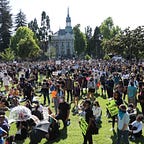Alternative to Police Needed NOW
Berkeley is catching up to what many cities around the country already have — an alternative to police response to noncriminal crises. In November 2020, San Francisco launched its Streets Crisis Response Team (SCRT) pilot. In March, Oakland is launching MACRO (Mobile Assistance Community Responders of Oakland). At about the same time, the Berkeley city council will be presented with recommendations from two different consultants to create two distinct teams to respond to noncriminal crises in our town. Overcomplicated? Most definitely.
One consultant has fleshed out what a Specialized Care Unit (SCU) would look like, while another consultant has designed a tiered Community Emergency Response Network (CERN). Since these teams would be responding to similar crises, it would be confusing and unproductive to have two different entities. Should two separate programs actually be implemented, this will undoubtedly lead to confusion with dispatch, overlapping jurisdiction and uncertainty within the community. Not to mention the unnecessary duplicative cost of such a scheme. In addition, too much division of labor could limit coverage and may result in the CERN and SCU teams sitting around waiting for their specific call.
Why were two consultants hired in the first place? Lack of clear leadership, vision, and oversight. However, the process can be redeemed if our city leaders streamline Berkeley’s non-police response to crises by implementing only one program.
Even though one of the consultants suggested police should be involved in some of the calls for service, Berkeley’s program should follow the lead of SCRT and MACRO and not have police involvement. People who would call the CERN/SCU are looking for a non-police response and having BPD respond to these calls, either as lead or as backup, would cause distrust in the community and lead to the same problem that we are currently dealing with — a hesitance to call city responders in the case of emergencies and other issues. Rather than working in concert with police, the CERN/SCU (see how easy that was to merge them?) should work solely on calls that do not require police assistance or backup.
It has been eighteen months since the council passed legislation to reimagine public safety. Last June, $1.2M was allocated in the interim to immediately address the noncriminal crises on our streets until the CERN/SCU is up and running. Those funds are finally being spent on substance use disorder specialists, mental health clinicians and other crisis specialists. Unfortunately, even this patchwork of interim resources weren’t in place soon enough to save the life of a man on January 9th. Had there been an alternative to the BPD, this 75 year old man may have survived. Instead, he was released from police custody into the freezing cold night — as he was deemed too sick to stay in the sobering cell — and found dead hours later behind the Public Safety building.
We need the CERN/SCU first responders on the streets of Berkeley and we need them now.
This article was first published in the Berkeley Times on January 27, 2022.
